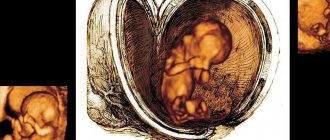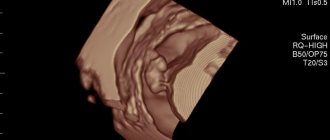Photo: UGC The 21st week of pregnancy is a full start endocrine system . The growth and development of the baby will occur very in the future . mother's body will have to react to these changes and adapt to them. Find out what difficulties a pregnant woman will face at 21 weeks, what changes will happen to the fetus.
What's happening
The 21st week of pregnancy is a kind of milestone, and from the end of this period the child will be able to live outside the mother’s womb. The internal organs of the fetus are fully formed, and now the process of their functioning is improving.
Your baby's skin has become tight, smooth and pink. Muscle and bone tissue grow and strengthen. At 21 weeks of pregnancy, the baby constantly swallows amniotic fluid, training its lungs and esophagus. The endocrine system is already working, and at this stage the spleen joins it.
The active development of the brain continues: the cortex is formed, new convolutions and grooves appear, and nerve cells divide. At the 21st week of pregnancy, fetal movements become more coordinated.
In a sufficient amount of amniotic fluid, the baby freely changes position: it turns upside down, then upside down, and spins around its axis. During the day, movements alternate with periods of deep sleep. Monitor the movements of the baby during waking hours: the 20th - 21st week of pregnancy is the period when excessive activity can be a sign of a lack of oxygen, in addition, it happens that in later stages sharp chaotic movements lead to the fetus being entangled in the umbilical cord. Therefore, be sure to tell your doctor about this.
Feelings of the expectant mother
Normally, a woman gains 6-6.5 kg, the weekly increase is 500-800 grams. Monitor your weight yourself: a sharp increase is an alarming symptom.
You may occasionally feel a tug in your lower abdomen. If the sensations are moderate, are not accompanied by bleeding and go away on their own, there is nothing to worry about. Pain may be associated with increasing stress on the ligamentous apparatus that holds the uterus, as well as with false Braxton-Hicks contractions. They are named after the doctor who first described them. The reasons for the phenomenon are not fully understood, but starting from 21-22 weeks of pregnancy, this is a completely normal condition.
Fetal movements bring great joy and new impressions to a woman during this period. Now this is no longer a barely perceptible fluttering or gurgling, but full-fledged tremors, which can be observed even visually.
The question “how often should a baby move” at 21 weeks is not yet so pressing. You can count at least 10-12 episodes of movement per day from 26-28 weeks. But if you suddenly stop feeling the movements of the fetus in the womb, this is a reason to consult a doctor: he will listen to the baby’s heartbeat and, if necessary, refer him for an ultrasound.
Risk factors
During this period, swelling is especially dangerous. Due to the slowdown in blood circulation, fluid accumulates in the tissues of the legs. The cause of edema can also be excess water in a woman’s body. If they are localized in the leg area, this does not affect the course of pregnancy, but if the face is swollen and this condition does not go away for a long time, you should definitely visit a doctor, because this may be a sign of serious complications.
Starting from the second trimester, the risk of thrush increases. This disease is caused by a fungus and appears when there are problems in the immune system (at 21 weeks of pregnancy, the body’s defense mechanisms are weakened). Symptoms of the disease are discomfort, itching and redness of the skin in the genital tract, cheesy discharge, pain during sexual intercourse and urination. If thrush is not treated, the child can become infected with the fungus.
Sometimes at the 21st week of pregnancy a complication such as thrombosis occurs. It is manifested by redness and soreness of the skin in the area of inflammation, as well as severe swelling of the lower leg. If you experience similar symptoms, be sure to make an appointment with a phlebologist or vascular surgeon.
Interesting Facts
| Options | Indications |
| Time from conception | 19 weeks |
| Period by month | 21 weeks |
| What month | 5 |
| Dimensions and weight of the fetus | 260-270 mm, 350 g |
| Uterus dimensions | 2 cm above the navel |
| Pregnant weight | From the beginning of pregnancy +3.5-6 kg, increase over the last week no more than 400-500 g |
Your baby is the size of
Large carrot
260-270mm Size
350 g Weight
The unpleasant symptoms of the first trimester of pregnancy are over, but the belly is not yet large enough to cause significant discomfort. Therefore, at 21 weeks the mother usually feels good and confident. And the unborn child continues to grow and develop, his motor activity increases.
Recommendations
- If you experience shortness of breath at 21 weeks of pregnancy, start learning breathing techniques. Subsequently, they will be very useful during the birth process;
- Due to hormonal changes, the skin may become covered with pigment spots. To get rid of them, try wiping such areas with lemon juice or milk;
- If you are worried about heartburn, try not to eat before bed, because in a horizontal position, gastric juice rises to the throat and burns the mucous membrane. During heartburn attacks, you can take a knee-elbow position for a few minutes;
- Constipation is one of the most common problems faced by women in the 20th – 21st week of pregnancy. In order to cope with it, you need to reconsider your diet. Eat more fermented milk products (but don’t go heavy on cottage cheese and hard cheeses), enrich your diet with sources of fiber (vegetables, fruits, bran bread), start the day with a glass of water.
Tests and ultrasound
By the 21st week of pregnancy, the results of a triple test will be known, identifying the risk of chromosomal abnormalities and hereditary diseases. If they turn out to be positive or doubtful, additional examination will be needed: a repeat blood test, invasive methods, for example, amniotic fluid sampling.
A woman should visit a gynecologist at least 1-2 times a month. Before this, you need to take a general urine test. The doctor monitors the development of the fetus and changes in the mother's condition by measuring indicators such as the baby's heartbeat, the mother's blood pressure and weight, the height of the uterine fundus and the volume of the abdomen.
Checklist for 21 weeks of pregnancy
The tendency to stretch marks is genetically determined, so if you are predisposed, you cannot completely avoid them. However, there are effective ways to reduce their consequences:
Entrust your pregnancy management to the specialists of the Medical Women's Center. We offer an individual approach, convenient appointment times without queues, constant communication with your doctor, all tests and studies in one place.
Belly size at 21 weeks
The abdominal circumference at 21 weeks of pregnancy is approximately 71-74 cm.
The growing uterus at 21 weeks of pregnancy continues to put pressure on the internal organs. At this stage, pregnant women experience difficulty breathing. Shortness of breath in pregnant women is associated with pressure from the uterus on the diaphragm and lungs, and for many expectant mothers it persists until the onset of childbirth. A simple but quite effective way to cope with the lack of oxygen is breathing exercises for pregnant women. If you have difficulty breathing at night, you can try sleeping in a semi-sitting position with a couple of large pillows under your head.
At 21 weeks of pregnancy, pain in the lower back and back, as well as in the navel area, becomes increasingly noticeable. A pregnant woman may complain of pain and heaviness in her legs, swelling, and even cramps. Wearing the right clothes and shoes, gymnastics or yoga for pregnant women, foot baths and a light relaxing massage will help the expectant mother cope with unpleasant sensations.
Weight gain at 21 weeks of pregnancy ranges from 3.1 kg (with a BMI of more than 26) to 6.1 kg (with a BMI of less than 19.8). To calculate your individual weight gain at 21 weeks, use the pregnancy weight gain calculator.
Pain
The 21st week of pregnancy can be distinguished by the appearance of a wide variety of pains that arise due to the body being thoroughly “adapted” for bearing and further birth of a child. It is likely that now you will experience pain in your navel and a feeling of pressure on your stomach in this area from the inside. The fact is that the uterus has now reached just such a standing height at which it begins to put pressure on the navel. As pregnancy progresses, when the uterus passes this section of the path, the pain in the navel and the feeling of pressure on it will go away on its own. The weight that has increased over the previous time also causes significant stress on the legs and, in particular, the knee joints. It is not surprising that at the end of the day a woman may experience pain in her legs, and at night wake up from cramps in her legs. By the way, cramps during this period are also a consequence of the increased need and, probably, lack of calcium in the pregnant woman’s body, which is now consumed to the maximum by the growing fetus. To reduce problems associated with pain and fatigue in the legs, and to avoid cramps, it is advisable to increase your dietary intake of calcium-containing foods, and also give your legs a rest regularly throughout the day. Stay in a standing position less, when sitting down, do not cross your legs, taking a horizontal position - raise your legs to a height, for example, on the cushion of a sofa. It is good to massage your legs and feet in the evenings, and take warm foot baths with the addition of a decoction of soothing herbs. As your weight increases, the stress on your spine and lower back will increase. To avoid back pain, avoid prolonged walking and sitting, do not sit on chairs without a backrest, learn to get out of bed correctly (first lower your legs to the floor, and only then get up yourself), lift and carry heavy objects: it is better to distribute the load equally in two hands, and bending down, slightly spread your legs to the sides and sit down, bending them at the knees; If you lift something heavy, distribute the load across your buttocks, hips and shoulders.
Lifestyle recommendations
- Do not lift heavy objects and avoid stressful situations, as these are additional risk factors that affect the tone of the uterus.
- Do not use aggressive household chemicals: harmful volatile substances entering the body through the respiratory tract can lead to poisoning.
- Do not visit a bathhouse or sauna, do not take a bath or shower with a water temperature above 37-38°C, since steam and hot water raise a woman’s body temperature, which provokes developmental defects in the child, and in some cases leads to the threat of miscarriage.
- Wear shoes that are spacious, do not constrict your feet, and do not have high heels.
- Sleep on your left side with pillows under your back and between your knees. Take rest during the day.
How the baby grows at 21 weeks
At 21 weeks the baby is about the size of a carrot.
At week 21, the Baby has grown a little more - to 22-23 cm, his weight has increased to 270-310 g. At this time:
- the skin begins to thicken, becomes a little rougher, although it still remains very tender;
- glands located in the skin produce a special lubricant consisting of the secretion of the sebaceous glands and epidermal scales. The lubricant protects the baby’s delicate skin from mechanical damage, protects against harmful microorganisms, has bactericidal properties, and forms the immunity of the skin itself. Amniotic fluid can no longer penetrate the Baby's skin - lubricant prevents this. This lubricant is also called vernix, it helps to “glide” along the birth canal - you can see it on the Baby’s body when he is just born;
- small fatty deposits form under the skin, making it less transparent;
- You can determine your Baby's blood type and Rh factor.
Half of the pregnancy is over!
The 21st week has arrived, which means that half of the gestation period has already passed. At 21 weeks of pregnancy, your belly is already becoming noticeable to others, fetal movements are felt more clearly, some mothers note that their babies are especially active and even see their movements. What happens to the baby at 21 weeks of pregnancy? He continues to grow actively, his hearing is quite well developed, a swallowing reflex has appeared, and taste buds are actively forming. At this time, a pregnant woman's diet should be especially balanced and healthy. Some expectant mothers note an increase in appetite, sometimes manifested by bouts of severe hunger. Experts recommend not to get carried away, otherwise a sharp and at the same time unwanted weight gain cannot be avoided.
21,22,23,24 weeks of pregnancy: what happens, development of pregnancy and fetus
- home
- Services and prices
- Services and prices
- About Us
- Doctors
- Schedule and appointments
- Reviews
- Doctor training
- Clinic addresses
- Blog
- CIropedia
Week by week 21 - 24 weeks of pregnancy Elena Gevorkova Obstetrician-gynecologist, Moscow
21st week
BABY
The height of the fetus from head to toe this week is about 25 cm, and the weight is 300-400 g. At the 21st week of pregnancy, the baby is already very similar to a newborn baby, but somewhat thinner and with a larger head. Eyebrows and eyelashes are fully formed, and the fetus blinks frequently. His skin becomes flesh-colored, thickens, and constrictions appear on it due to the development of subcutaneous fat.
Intensive development of the muscles and skeleton of the fetus continues. The baby is active, and his small size allows him to perform many different movements - somersaults, turns around his axis, intense bending and extension of his arms and legs. During the day, the fetus can change its position in the uterus dozens of times: it lies upside down, downside down, or lies transversely in the uterus.
The fetus's hearing develops so well that it reacts not only to loud and sharp sounds, but also to conversations and music.
At this stage of pregnancy, intensive development of the fetal gastrointestinal tract continues. Receptors are formed on the taste buds of the tongue, and the baby clearly distinguishes the taste of amniotic fluid.
Future mom
The general well-being of pregnant women at this stage, as a rule, does not undergo significant changes compared to previous weeks. The movements of the fetus are felt more intensely, often the periods of sleep and wakefulness of the woman and the fetus do not coincide, and the mother may wake up at night, awakened by the baby. However, there are no painful sensations at this stage, since the fetus still has insufficient physical strength.
From the 21st week, a pronounced weight gain of the expectant mother begins due to the growth of the baby and the accumulation of muscle and fat mass. This is precisely what explains the increased appetite of a pregnant woman at this stage.
The development of the fetal skeleton requires an increase in calcium consumption. And if there is a deficiency of free calcium in the body of the expectant mother, then from this period problems with teeth are possible: their fragility increases, the teeth begin to crumble and collapse as a result of “washing out” of calcium from the dental tissue. It is extremely important to adhere to a balanced diet: consume dairy products - cheeses, cottage cheese, kefir. The calcium content is also quite high in fish, cereals, legumes - lentils, beans, as well as in vegetables such as broccoli. However, it must be remembered that calcium is best absorbed from vitamin complexes and medications. And it is quite possible that at this stage of pregnancy the doctor will prescribe the woman additional calcium intake, based on the condition of the pregnant woman and the test results.
Week 22
BABY
The baby's height is 28-30 cm, and by the end of the 22nd week he will weigh about 500 g. The proportional ratio of the size of the head relative to the body continues to change. The advance of the head is no longer so significant, and the length of the limbs is no longer so far behind the body: all these changes bring the baby’s appearance closer to its usual appearance. From this stage of pregnancy, the fetus begins to periodically straighten its legs, which previously were mainly in a bent state. Characteristic of this period is intensive improvement of the central nervous system. In the period from the 21st to the 25th week of intrauterine development, the weight of the brain increases from 20 to 100 g - this is a very intensive increase in mass.
The fetus makes small movements more and more clearly - moves its fingers, moves its head in different directions. If earlier for his favorite activity - thumb sucking - the baby raised his hand, feeling his face, then from 22-23 weeks he begins to tilt his head, as if getting his thumb into his mouth. This “towards” movement reflects quite serious processes occurring in the central nervous system. This is evidence of perfect sensitivity and coordination, i.e. a state when the fetus clearly senses the position of its body in space.
Amazing fact: by 22 weeks, the brain contains a full set of brain cells - neurons. This is exactly the amount of them that will be in the baby’s brain after birth and throughout life. The rest of the time there will only be an increase in connections between these cells and an improvement in brain function.
Future mom
The height of the uterine fundus by this time reaches 2 cm above the navel. The volume of the abdomen is not yet too large, but, nevertheless, the internal organs react to the rapid growth of the uterus, under the influence of which a forced change in their usual location occurs. So, at this stage, expectant mothers often feel discomfort in the area of the lower ribs, which move slightly apart under the pressure of the fundus of the uterus. To get rid of this, you need to monitor your posture and keep your back straight. Changing body position, bending, turning the body and other simple exercises will help relieve pressure on the ribs and relieve discomfort.
If the fundus of the uterus puts pressure on the stomach, then pregnant women feel heaviness after eating and heartburn. A change in the position of the stomach to a more horizontal one, as well as hormonal levels (high levels of progesterone) relax the muscle that closes the transition from the esophagus to the stomach - the sphincter. The contents of the stomach - food soaked in acid - are thrown back into the esophagus. Normally, this does not happen and the sphincter must close completely after food passes into the esophagus. During reverse reflux, the esophageal mucosa reacts to the acidic contents and pregnant women feel a burning sensation and an unpleasant taste in the mouth - heartburn. To prevent these phenomena, it is necessary to chew food thoroughly, eat in small portions, and not lie down immediately after eating, allowing the food bolus to move freely from the stomach without lingering in it. If these symptoms cause discomfort in a pregnant woman, you should inform your doctor. A rational diet and medications will help get rid of this problem.
Week 23
BABY
Fetal development at this stage is characterized by intensive formation of the respiratory system. From this stage, the fetus begins to make constant breathing movements. Before this period, they occurred sporadically and did not last long, but now respiratory movements continue for up to 40 minutes. Their frequency is 50-60 per minute. This systematic lung training will continue until childbirth. With each movement simulating inhalation, a certain amount of amniotic fluid enters the respiratory tract up to the closed glottis and is pushed out, washing the epithelium - the covering cells of the respiratory tract.
The fetus continues to swallow amniotic fluid, the liquid part of which is absorbed into its bloodstream, and the remaining part forms meconium - original feces. Sometimes intensive ingestion of water by the fetus causes irritation of the diaphragm - the flat muscle that separates the chest and abdominal cavities - and its subsequent contractions. This manifests itself in the form of rhythmic movements - “fetal hiccups”. This phenomenon occurs often and is not a sign of trouble. As a rule, “hiccups” last for several minutes and do not cause any discomfort to either mother or baby. If it occurs frequently and lasts several hours, you should inform your doctor about it to rule out other causes of hiccups, such as fetal hypoxia.
An important event of the 23rd week is the improvement of the hematopoietic organs and immune system - liver, spleen, bone marrow, lymph nodes and thymus. The thymus, or thymus gland, is the most important endocrine gland located behind the sternum. It grows intensively during intrauterine development and with the onset of puberty it atrophies - it decreases in size and stops functioning. The thymus can be called the “school of lymphocytes.” “Untrained” lymphocytes enter the thymus tissue, undergo maturation in it and exit into the blood as adult T-cells - strong lymphocytes that can resist foreign agents.
The baby’s own immune system during intrauterine development is only in the formative stage and is not able to independently protect the fetus. The main role of protection is performed by mother cells - antibodies. From the 23rd week, the baby’s immune system begins to “train.” The baby’s body learns to recognize antigens - foreign cells (bacteria, viruses, etc.), remembers them and forms a defense.
Future mom
At the 23rd week, the height of the uterine fundus reaches 4 cm above the navel. The volume of the uterus increases not so much due to the fetus, but due to amniotic fluid and the mass of the placenta. The weight gain during this period is about 5-7 kg. It is important to continue to monitor your diet to prevent excessive weight gain.
Due to the intensive growth of the uterus, the center of gravity shifts, the spine and joints may react with sensations of discomfort: aching pain occurs when walking, sitting, etc. This may require the appointment of wearing special support underwear or a bandage.
Week 24
BABY
The weight of the fetus at this stage is about 33 cm, and its weight is 600 g. The baby occupies the entire space of the uterine cavity, its movements become more distinct and less intense. The fetus is able to radically change its position from the head to the pelvic and vice versa, but gives preference to smaller movements - plays with the umbilical cord, bends and straightens the limbs. During this period, the number of muscle fibers increases sharply and reaches a maximum. Further, the increase in muscle mass will occur due to an increase in each muscle fiber in volume.
This period is characterized by the improvement of the fetal senses. Skin, vestibular, taste, and auditory sensitivity have become more complex over the past weeks and by the end of the 24th week they reach a fairly high level of development. The intensive development of the brain and the formation of connections with the senses determine the complex behavior of the fetus. The baby not only reacts to external stimuli - sounds, bright light, mood and well-being of the mother, but also forms certain behavior depending on external signals. So, if bright sunlight falls on a pregnant woman’s belly, the fetus turns away, squints its eyes, and covers itself with its arms. To loud and sharp sounds or situations when the mother experiences excitement, fear, anxiety, the baby either reacts with intense movements or, on the contrary, freezes.
Future mom
Weight gain during this period is approximately 500 g per week. The volume of the abdomen increases not only due to the growth of the uterus, but also due to its stretching. This may be accompanied by some pain. They should not be pronounced and last a long time.
Quite rapid weight gain may be accompanied by the appearance of edema, which at this time occurs due to compression of large veins by the growing uterus and difficulty in the outflow of lymph. Most often this is manifested by swelling of the feet, which intensifies in the evening. It is important to maintain a rest regime, try to rest your legs, and, if possible, elevate them to improve the outflow of venous blood. It is necessary to take care of comfortable shoes: this is an extremely important condition for the comfort of your feet. Using special compression garments - stockings or tights - will help reduce the appearance of swelling and prevent the development of varicose veins.
Wearing compression hosiery and selecting the degree of compression is recommended by a gynecologist or phlebologist.
Possible complications
The twenty-first week of pregnancy is a relatively calm period. The risks of spontaneous abortion are minimal compared to the first trimester. However, you need to know those alarming symptoms that indicate complications of pregnancy and require immediate medical attention. Timely treatment in most cases allows you to save the fetus and minimize risks for the woman.
Placental abruption
This diagnosis is made if the placenta separates from the physiological attachment site in the uterine cavity. Manifests itself in the form of heavy bleeding, dizziness, hypotension and severe pain in the lower abdomen. The condition requires immediate treatment in a hospital setting.
Low placentation
If ideally the placenta is attached to the highest point of the uterus, but with low placentation it is located closer to the exit of the uterus. This is dangerous because as the fetus grows, the placenta may begin to separate. There is no specific treatment. Physical activity and sex are prohibited for a pregnant woman; regular frequent monitoring by a specialist is indicated.
Bloody discharge during pregnancy
Any discharge that resembles blood is not healthy during pregnancy. However, on average, 15-25% of women experience something similar in the first trimester. Blood can also be released in small quantities when the fertilized egg attaches to the endometrium, however, in the vast majority of cases, at this moment the woman can only guess about the presence of pregnancy.
This phenomenon is not a generally accepted norm or pathology. However, if you notice a significant increase in the intensity of discharge, or beginning uterine bleeding, urgently consult a doctor for timely treatment and preservation of pregnancy. Our doctors have extensive experience in all types of medical services during pregnancy, and our clinic is dedicated to protecting your health and the life of the baby growing inside.
Discharge at different stages of pregnancy
Bleeding in the early stages may be due to the following factors:
- "Phantom" menstruation. If your menstruation occurs clearly according to your cycle, your sex hormones can “remember” it and cause a semblance of critical days at a certain time. This will not affect the development of pregnancy in any way, but in such a case additional diagnostics and transvaginal ultrasound are necessary.
- Implantation of the fertilized egg may cause low-intensity bleeding for 1-2 days. At this time, a woman most often does not know that she is pregnant.
- Hydatidiform mole is a fairly rare cause of bleeding during pregnancy. It signals pathological development of the fetus and incorrect formation of the placenta. If a doctor diagnoses you with such an anomaly, you must urgently have an abortion, and then monitor your health and prevent another pregnancy for some time.
- Ectopic pregnancy. Another unpleasant reason for early discharge. It is characterized by the maturation of the fertilized egg outside the uterus, namely in the fallopian tube. The woman needs to take measures to quickly eliminate the fetus from its location. Otherwise, this can result in pipe rupture, internal bleeding and even death.
- Fetal rejection in multiple pregnancies is an uncommon occurrence in natural healthy pregnancies, but is typical for a certain percentage of women who have undergone IVF. It is characterized by rejection and expulsion of one embryo during the further development of another.
- Infectious diseases of the reproductive system in the mother.
- Cervical polyp , like any disease, is additionally accompanied by pain and severe cramps.
- Irritation of the cervix - the vulnerability of the organ during pregnancy can cause it to suffer from any mechanical impact, be it sexual intercourse or medical manipulation during microflora studies.
- Genetic predisposition - requires a detailed study of family history.
- Uterine fibroids cause bleeding if its nodule is located at the site of attachment of the embryo.
- Stress and trauma. External factors are extremely important for a healthy pregnancy. Psycho-emotional shocks, domestic violence, accidents, mechanical injuries - all this has a detrimental effect on the course of pregnancy and can cause its spontaneous termination. A miscarriage that has begun is not a reason to give up. Numerous patients of our clinic have maintained healthy pregnancies under the strict supervision of experienced doctors. A timely visit to the doctor is the key to a healthy pregnancy.
What does bleeding in the later stages indicate?
- Natural removal of the mucus plug that blocked the entrance to the uterus (normal for the prenatal condition);
- Infections of the genitourinary system that adversely affect the course of pregnancy;
- Placental abruption;
- Cervical erosion;
- Preeclampsia;
- Premature birth.
If you notice any alarming symptoms, we recommend that you consult a doctor immediately. If the bleeding is accompanied by severe cutting pain, stay calm and call an ambulance.
What is the relative norm?
Bloody discharge is normal if:
- They are observed only in the very early stages;
- They have a light spreadable consistency;
- Do not have a strong unpleasant odor;
- Their color resembles menstrual blood in the final days of the cycle.
Remember: there can be no absolute norm in this case. In some women, spotting may occur several times during pregnancy and not pose a risk to the life of the fetus; for others, it risks miscarriage. We recommend contacting our clinic at the slightest suspicion of illness or threat of miscarriage.
What to do?
- Don't panic. Take a horizontal position and call an ambulance or go to the hospital yourself;
- Refrain from sexual intercourse, even if the discharge is weak and you are not bothered by pain;
- Follow the advice of your treating specialist.
In our clinic, you will undergo a series of studies to accurately determine the cause of the deviation. These include transabdominal and transvaginal ultrasound, blood test for hormones, smear, cervical biopsy (if erosion is suspected).
Under no circumstances should you try to eliminate discharge on your own by taking medications without a doctor’s prescription. By self-medicating, especially during such a crucial period as pregnancy, you endanger not only yourself, but also the unborn baby.
If, nevertheless, you were unable to keep the child, our specialists will select supportive and restorative therapy for you, thanks to which you can soon become a healthy and happy mother.










